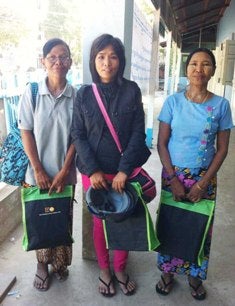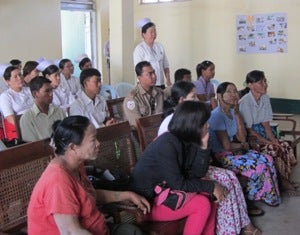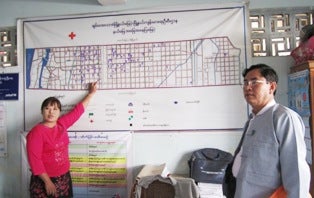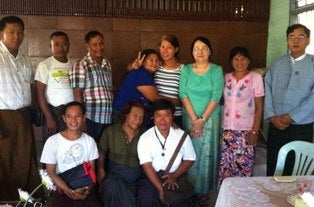UNFPA experts travelled to Mandalay, Myanmar’s second largest city, to discuss AIDS prevention with HIV health workers, government officials and key population from the sex worker community. On a global scale 35.3 million people live with HIV. In Myanmar 215,000 people have HIV, but that number is expected to rise in coming years as the population becomes more mobile as a result of the country’s on-going socio-economic transformation.

The experts visited four HIV and AIDS supported health facilities in the Mandalay region as part of its comprehensive condom programme (CCP) and HIV prevention of mother to child transmission programme (PMCT). “UNFPA started the condom distribution programme as part of its HIV prevention efforts. Our aim is to reduce the stigma attached to HIV and usage of condoms by adopting a zero discrimination approach by increase awareness amongst all stakeholders,” said Dr. Ni Ni Khaing, UNFPA’s National Programme Officer on HIV/AIDS.

“I always talk to my friends saying that they should always use a condom to help prevent contracting HIV and other Sexual Infectious Diseases (STIs). They also use condoms for family planning purposes,” said Daw Mantlo, 43 year-old peer educator and former sex worker in Mandalay during a town hall meeting held at the Chan Aye Thar Zan clinic. Mantlo, whose name literately means “Burmese love” is one of several peer educators who herself is HIV positive and works closely with the Mandalay sex community handing out free contraception such as male and female condoms and lubricants, including providing advice to affected groups on stigma free locations for free testing on sexually infected diseases and HIV in confidence, HIV and reproductive health screening services as well as antiretroviral treatment drugs and other universal precaution material, as well as training and social support.

HIV/AIDS is still considered a taboo subject in Myanmar and as a result of the stigma attached to the disease many delay or even avoid getting tested or receive treatment until it is too late. The UNFPA is focusing on prevention of HIV/AIDS through sexual transmission amongst young people, women and most at risk groups such as female sex workers and men who have sex with men as well as those people who inject drugs. The UNFPA contributes US$5.8 million to the Myanmar HIV/AIDS country programme and covers one third of the country’s need for contraception.

During the meetings held at the health centre several of the participations invited were hotel managers in Mandalay, whom are actively taking preventative actions to reduce stigma and at the same time increasing awareness on HIV/AIDS, by placing condoms in their hotel rooms, something which has previously been unheard of. “As a manager I always educate my staff about sexual health. In additional we now distribute, in the hotel rooms and in the toilets, free of charge condoms. Since implementing this scheme, we have found that approximately 50% of the guests do use them, and there is an ever increasing demand from the guests to continue supplying this service,” said U Myint Win Tun, a hotel manager of a large hotel in Mandalay.
On a nation-wide scale UNFPA supports under its 3rd country programme and HIV prevention project, the comprehensive condom programme (CCP) which covers 34 townships and 32 townships for the HIV prevention of mother to child transmission programme (PMCT). Both programmes are part of the National AIDS Programme which reaches out to townships located in Yangon, Ayeyarwaddy, Mandalay, Bago, Shan, Yakhine and Magway. UNFPA focuses mainly on prevention of HIV through sexual transmission.





